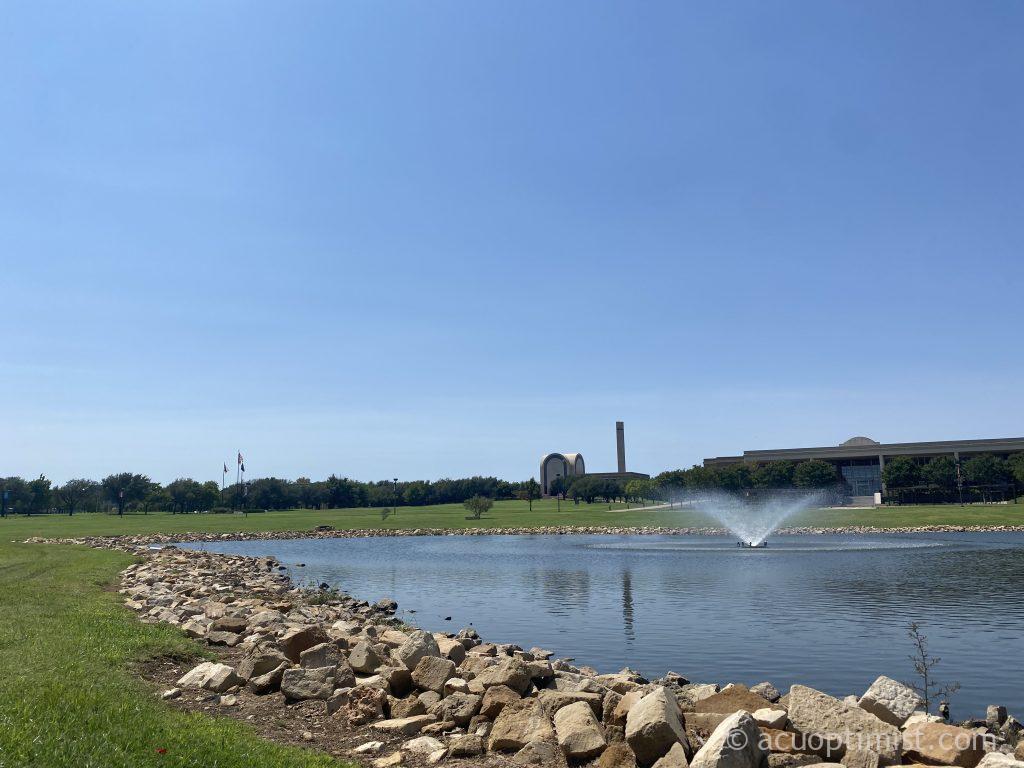If you drive out to Lake Fort Phantom, you will probably notice the dry, brown plants on your way. And if you’re a regular, you’ll also notice that the water is significantly lower this year than it has been in the past few years.
The summer months of 2022 were some of the hottest on record, with daily temperatures exceeding 100 degrees and a small total of 1.62 inches of rainfall from May through July.
The widespread drought brought challenges to communities throughout the country, and the water shortage led to extreme wildfire danger, struggling ecosystems and massive inflation of agricultural resources. All of these impacted ACU.
But even during extreme heat and little rainfall, campus landscaping flourishes with green grass, healthy trees and a full Fabius Fountain Lake. Director of Landscaping and Grounds Scott Warren said this summer his crew watered areas on campus up to 10 times a week. In years with normal rainfall, areas on campus only need to be watered up to four times a week.
When rain doesn’t fall from the sky to keep plants watered, people must do it manually. ACU uses a reclaimed water system to bring water to campus. The system takes greywater –water that has already been used by the city through dishwashers, laundry machines, sinks, showers and baths – and repurposes it. (Fighting the urge to run through the sprinklers is highly recommended.) Second-use water costs 90% less than first-use water, and Warren said it’s the biggest reason why his team was able to keep campus green.
“It is probably the most ecologically friendly thing the university does, is we don’t use fresh water,” Warren said. “Just think of the 1.3 million gallons of irrigation we’re pumping per year. That’s huge savings in potable water use.”
The water is stored in Fabius Fountain lake, and is used in the sprinkler systems to give grass, trees and other plants on campus the water they need to photosynthesize and grow.
Although it might be a sustainable way to get water, not using clean water treated to prevent algae growth comes with challenges.
Michael David, director of irrigation, said there are 12,000 – 15,000 sprinkler heads on campus. With pipes buried in hot dirt, water temperatures rise, creating the perfect environment for algae growth. Running sprinklers more frequently means sprinkler heads get clogged with algae more frequently. So Warren said David’s team of three, sometimes four men spent their hot summer days out in the heat, cleaning each individual algae-clogged sprinkler head to keep the water flowing freely.
“This summer was almost twice as difficult, because of soil temperature and water temperature making more algae growth,” Warren said. “And you’re not getting any relief. There’s not any time of hey, we’re going to get a week of cool weather and some rainfall and it’s going to be okay, no. That didn’t happen.”
In a resource shortage, landscaping crews prioritized the highlights of campus, such as the green space in front of the Bible building, for maintenance. However, David said there was some landscaping loss on less prominent areas of campus due to simply not having the water or manpower to maintain it all.
“I am surprised at what we look at with what we have on our hands, I really am,” David said. “It’s something that’s never going to end. We’re never going to have an end to this, but we’re here to make the grass green and make a nice place for the students.”
Even off campus ACU staff was working hard to find solutions to a water shortage. Out at Rhoden Farm, ACU’s agricultural center, Farm Manager Riley Morrow was at the forefront of keeping animals cool and fed in the hot temperatures.
With little rain, the grazing pastures suffered. In order to make sure all of the cattle had enough to eat, Morrow made the decision to sell half of ACU’s cattle herd.
“The plants aren’t growing, and so my grass looks terrible from the amount of rain, or lack thereof, that we’ve had,” Morrow said. “There’s just not enough grass for [the cows] to eat.”
Farms everywhere are forced to sell their cows for the same reason, meaning the price of cattle has plummeted significantly. Not only has their price reduced due to the influx of supply on the market, but also because cows are priced by pounds, and when animals experience extreme heat, they are prone to heat stress and lose weight as a result.
But it wasn’t just the cattle’s food supply that was affected by the dry summer. Just as cow prices dropped, the price of hay inflated exponentially. Morrow said he used to pay an average of $75 for a bale of hay to feed his horses. Now, by sourcing hay from out of the area, he pays $130 for the same amount, a price he says is cheap compared to the $250 bales sold at the local feed stores.
“Aside from just the price, my hay consumption has doubled because there has not been as much grass for [the horses] to eat,” Morrow said.
Even with the few inches of rain the region received in recent weeks, the U.S. Drought Monitor continues to classify Taylor County to be in extreme to exceptional drought, the two most severe levels listed. Although the rain has helped slightly, the Palmer Drought Severity Index indicates that the area still needs at least nine more inches of rainfall to officially be out of a drought. The struggles of little rain will continue for ACU’s staff that needs it, even as temperatures begin to decline.

